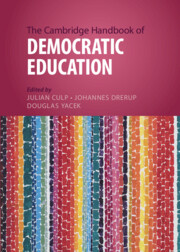Book contents
- The Cambridge Handbook of Democratic Education
- Cambridge Handbooks in Education
- The Cambridge Handbook of Democratic Education
- Copyright page
- Contents
- Contributors
- Acknowledgments
- Introduction
- Part One Historical Perspectives
- Part Two Philosophical and Normative Foundations
- 9 Normative Case Studies as Democratic Education
- 10 Moral Education and Democratic Education
- 11 Rawlsian Political Liberalism and Democratic Education
- 12 Social Justice Education and Democratic Legitimacy
- 13 Critical Theory, Local Moral Perception, and Democratic Education
- 14 Democratic Deliberation in the Absence of Integration
- 15 Education and Democratic Citizenship: Capabilities and Quality Education
- Part Three Key Topics and Concepts
- Part Four Challenges
- Index
- References
10 - Moral Education and Democratic Education
from Part Two - Philosophical and Normative Foundations
Published online by Cambridge University Press: 20 April 2023
- The Cambridge Handbook of Democratic Education
- Cambridge Handbooks in Education
- The Cambridge Handbook of Democratic Education
- Copyright page
- Contents
- Contributors
- Acknowledgments
- Introduction
- Part One Historical Perspectives
- Part Two Philosophical and Normative Foundations
- 9 Normative Case Studies as Democratic Education
- 10 Moral Education and Democratic Education
- 11 Rawlsian Political Liberalism and Democratic Education
- 12 Social Justice Education and Democratic Legitimacy
- 13 Critical Theory, Local Moral Perception, and Democratic Education
- 14 Democratic Deliberation in the Absence of Integration
- 15 Education and Democratic Citizenship: Capabilities and Quality Education
- Part Three Key Topics and Concepts
- Part Four Challenges
- Index
- References
Summary
Both democratic education and moral education have significant formative components. That is to say, educators in both domains are concerned not only with imparting knowledge and understanding and equipping pupils with skills and competences, but also with cultivating dispositions and attitudes. A central aim of democratic education is to dispose children toward democracy and a central aim of moral education is to make children moral. My particular interest in this chapter is in how we should understand the relationship between these two formative projects. Is the cultivation of democratic dispositions and attitudes an exercise in moral formation? Are democratic educators, to that extent at least, also moral educators?
Keywords
- Type
- Chapter
- Information
- The Cambridge Handbook of Democratic Education , pp. 146 - 159Publisher: Cambridge University PressPrint publication year: 2023

